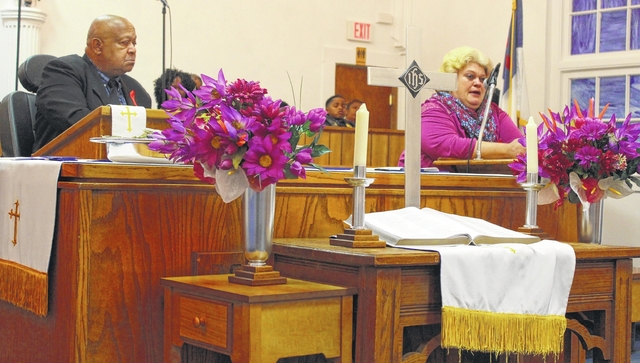While standing behind the pulpit of Olivet Institutional Baptist Church, LaCherie Hall fought back tears as she talked about her battle with AIDS and HIV. It began when she was diagnosed in 2002.
“My whole world turned upside down,” Hall said.
Hall was one of many people who participated in the 2016 National Week of Prayer for the Healing of AIDS, sponsored by the Sampson County HIV/AIDS Task Force. It’s been observed for more than 20 years as an initiative of the The Balm In Gilead. Its purpose is to spread awareness about the epidemic and to advocate for faith-based communities to become involved with education and prevention efforts in the black community. But Hall showed how it can effect people from all walks of life, regardless of race and gender.
While giving her testimonial, Hall spoke about being diagnosed in 2002 and making several trips to the doctor. She went for pneumonia and bronchitis.
“It got to the point where I had lost all of my hair,” Hall said. “My skin had turned red and my skin was peeling off. The doctor I was going to couldn’t tell me what was wrong.”
After getting a blood test from a different doctor, she found out about contracting the disease from her ex-husband. But with support from her family and proper medical treatment,Hall is thrived and watched her children grow up — something she was once afraid of not being able to do. Hall is now happily married to a new husband.
“If it hadn’t been for my young’uns, I would have never made it through,” Hall said about watching her daughter graduate and undergoing medical treatment. “My oldest daughter is now a nurse at Cape Fear.”
Following her remarks about survival, Hall received a hug from survivor Thomas McLaughlin Jr. and family supporters. The event led McLaughlin Jr., task force chairman, featured several remarks from officials working to stop the spread of it, which effects more than 1.2 million people in America.
“HIV/AIDS continues to spread out of control in our community,” said task force member Nettie Pernell. “African-American Women are disproportionately effected by HIV/AIDS.”
She continued and said the disease is the leading cause of death among black women, 25- to 34-years-old. Pernell added that the rate of the AIDS cases is 25 times higher than the rate for white women. Pernell also mentioned statistics referring to teenagers, gays and young people attending historically black colleges an universities.
“Time is running out on us,” Pernell said. “We need every pulpit that speaks to black people to raise their voices and encourage people to speak out about AIDS and HIV.”
Pernell said speaking out may include education, providing treatment, encouraging people to get tested and developing partnerships with local health departments or organizations.
Nicole Beckwith of the North Carolina’s Care and Prevention in the United States (CAPUS) also addressed the audience about the importance of awareness. In the state, CAPUS also stands for community awareness, purpose, unity and service.
CAPUS was created to reduce HIV and AIDS-relate infections and deaths among racial and ethnic minorities. According to 2014 statistics provided by Beckwith, more than 36,000 are living with the disease in North Carolina. From that total about 4,900 people are unaware. In 2014, more than 1,000 cases were reported. A variety of reasons were provided for the conditions.
“It runs the gamut,” Beckwith said. “We like to say one sin isn’t greater than the other. People have issues and people have problems. But those issues and problems that’s going on in their lives can have have a negative impact when we don’t help them deal with some of those things that they have going on.”
Beckwith said more and more people are getting tested, but only 59 of people infected make an initial appointment. Only 39 go beyond the first appointment and only 45 percent are virally suppressed, which means the amount of HIV is low. This helps those individuals to stay healthy and live longer.
“The percentages are very low and you’re less likely to transmit the disease to someone else,” Beckwith said.
To help deter the problem, Beckwith said there’s several programs available to help rid the stigma associated with HIV/AIDS. While sharing her story, Hall mentioned how she was hurt about paper cups being used, just for her.
The Rev. Willie Bowden Jr. of Olivet Institutional Baptist Church spoke and preached about the importance of compassion of helping others with the disease. After his sermon, he donated the church’s offering to the Sampson County HIV/AIDS Task Force. He noted that the church sometimes does more asking than giving.
“We need to be educated, the lack of knowledge is what cause men to parish,” Bowden said.

